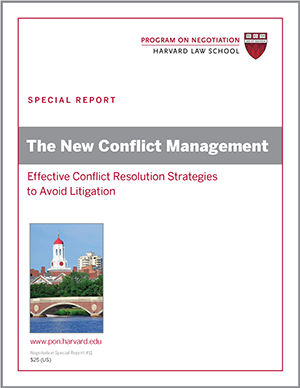
An agent—whether a real-estate agent, lawyer, literary agent, or financial adviser—can provide the knowledge, experience, connections, and negotiation skills and strategies needed to get you a great deal. But we tend to forget that agents’ and clients’ financial interests are almost never perfectly aligned. A busy real-estate agent may advise you to offer more for a house than is necessary in the hopes of wrapping up a quick sale and earning a commission. And a lawyer who bills by the hour may have incentives to research a cut-and-dried case more thoroughly than is necessary.
Managing conflicts of interest is important when navigating the principal-agent relationship, as the negotiation example of an ongoing dispute between TV writers and their agents shows.
Managing Conflicts of Interest in Hollywood
With the rise of digital streaming companies such as Netflix, Amazon Prime, and Hulu, TV writers are in high demand. But because of changes the writers’ talent agencies have made to their business model, writers’ wages are stagnating, according to the Writers Guild of America (WGA).
Traditionally, Hollywood agents have taken a minimum 10% cut of the deals they negotiate for writers. In the early 2000s, the major talent agencies concluded that to grow their business, they would need to move from relying on agency commissions toward content ownership, the New York Times reports.
The top agencies began accepting cash infusions from private-equity firms in exchange for partial ownership. Under pressure from the firms to find new revenue sources, Vanity Fair reports, large agencies have switched from the labor-intensive practice of negotiating deals for individual clients to bundling clients into package deals.
In a typical package deal, an agency offers a studio the main elements of a TV series from its stable of talent, including a showrunner, a pilot script, and perhaps a star or director, according to the Hollywood Reporter. Rather than paying agencies indirectly through client commissions, studios pay packaging fees to agencies up front, as well as a percentage of a show’s future profits. Packaging can be far more profitable than the commission model.
The rise of packaging created a conflict of interest in agents’ relationship with clients, according to the WGA. Because agencies are being compensated based on a show’s predicted value and success, they may be motivated to keep labor costs low to boost a show’s long-term profits. According to the WGA, packaging positions agents to suppress writers’ wages.
Taking a Stand
In the spring of 2019, following unproductive negotiations with the Association of Talent Agents (ATA), the agencies’ trade group, the WGA drafted a Code of Conduct that would require any agencies representing WGA members to discontinue packaging and in-house production, a plan supported by 95.3% of members, according to the Hollywood Reporter. When the 10 largest talent agencies refused to sign, the WGA ordered its members to formally drop their agents until they do.
The WGA also sued the four leading talent agencies—William Morris Endeavor (WME), Creative Artists Agency (CAA), United Talent Agency (UTA), and ICM Partners—alleging unlawful conflicts of interest. According to the suit, packaging fees violate California law, which requires agents to act in the best financial interest of their clients and inform them of possible conflicts of interest, the Times writes.
About 80% of TV writers with agents reportedly sent termination letters to their agents. Over the next year, UTA, ICM, and about 100 smaller agencies agreed to sign an agreement ending packaging deals and limiting agencies to a 20% ownership stake in affiliated production companies. As of November 2020, the WGA’s negotiations with WME and CAA remained unresolved.
Managing Conflicts of Interest
Consider the following guidelines for managing conflicts of interest with your negotiation agent:
- Research your agents’ incentives. When interviewing potential agents, don’t accept their financial conditions at face value. Think about the conflicts of interest an agent may face when representing you, and compare their proposed compensation terms to industry standards.
- Negotiate to reduce conflicts of interest. Openly discuss any concerns you may have with prospective agents and explore alternative compensation models. Emphasize the need to agree to terms that will reduce or eliminate potential trouble spots and promote a productive long-term relationship.
- Examine new business models. The WGA tolerated talent agencies’ packaging practices for decades before arguing that they were unlawful. Scrutinize counterparts’ new ways of doing business from the start, and renegotiate your contract at regular intervals.
What advice do you have for managing conflicts of interest?




